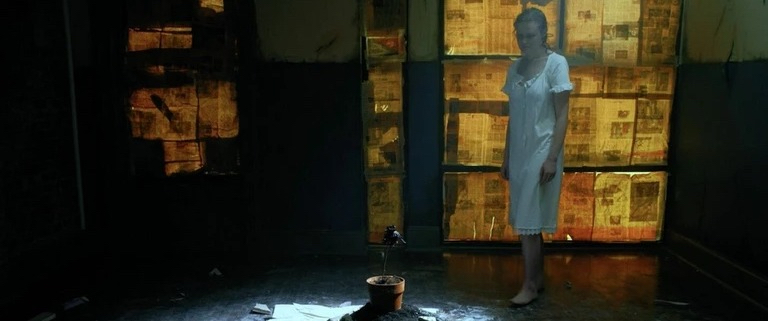WILDFLOWER
dir. Wan Xin Tang

“Wildflower” (written and directed by Wan Xin Tang) is a film about River (actress Kelsey Carthew), a woman in the final stages of preparing herself as a sacrifice for a blood-sucking flower, and it feels like a corpse in all the best ways. It’s electric at first, then discomfitingly quiet, but ultimately fertile, fishing the fecundity out of decay. It opens with a bombardment of sensation, overwhelming in its excess as drawling ads for a butcher shop offering meat at an impossible deal blare over the whine of saws through bone, the hammering of blades through meat, and the camera cuts so quickly that all the dead flesh begins to blur into a single nauseating smear of greasy off-red. Once River purchases her meat and leaves, however, the movie pivots hard. “Wildflower” goes silent, as though the frenetic pulsing we’re introduced to was merely the death throes of a dying beast.
In her apartment, newspaper-covered windows mean claustrophobia sets in swiftly. Sanctity and devotion intertwine with bleeding and consumption. Liquid seeps through the ceiling like pus from a wound. And through it all, not a word is uttered—is that out of respect for her mysterious floral charge, or out of fear? Slowly, a sense of ritual emerges: River dices the meat small, stacks it carefully, consumes it raw. She drinks red wine joylessly, with ice. She cleanses her body with water and then adorns herself in a white gown. The film’s lack of speech opens space for a different sort of soundscape to emerge, a landscape of loneliness constructed out of leaky faucets, heavy rainfall, itchy fabrics, and exhausted mastication. That discomfort careens into outright horror with a shocking cut as dream descends into nightmare and the extent of the ritual is revealed. What we’ve witnessed so far is merely the preparation, and of course, the worshipping is so much more.
Five nude figures lead River out of the black box play that is her life to a lonely spot in a forest where she digs her own grave, slits her wrists up the river (her blood is nectar-thick), and devotes all of herself to her botanical god. The final scene is a long, lingering shot of that ruined apartment, finally overgrown with similar flowers but utterly devoid of human life.
There are elements of all sorts of tangled influences, from Walt Whitman’s obsession with plant and human embodiment, to the delicate, suicidal madness of Shakespeare’s Ophelia, to even Little Shop of Horrors. However, “Wildflower” carves its own frontier, wildly impressive in how much it accomplishes with slightly over ten minutes and approximately three sets. Explanations are neither forthcoming nor needed; the importance of the ritual is never explained, her relationship with the flower is utterly enigmatic, and perhaps the ending is even supposed to be a happy one. Despite the absolute uncertainty that permeates every second of this film, atmosphere and emotion ultimately leave room for just one question, heavy as intruding on a worship hall: is it okay to even be witnessing this?
Terry Hudson (they/them) is a genderqueer poet, writer, and the 2025 Nightboat Editorial Fellow, raised on a Dexter cattle farm in Climax, NC.
